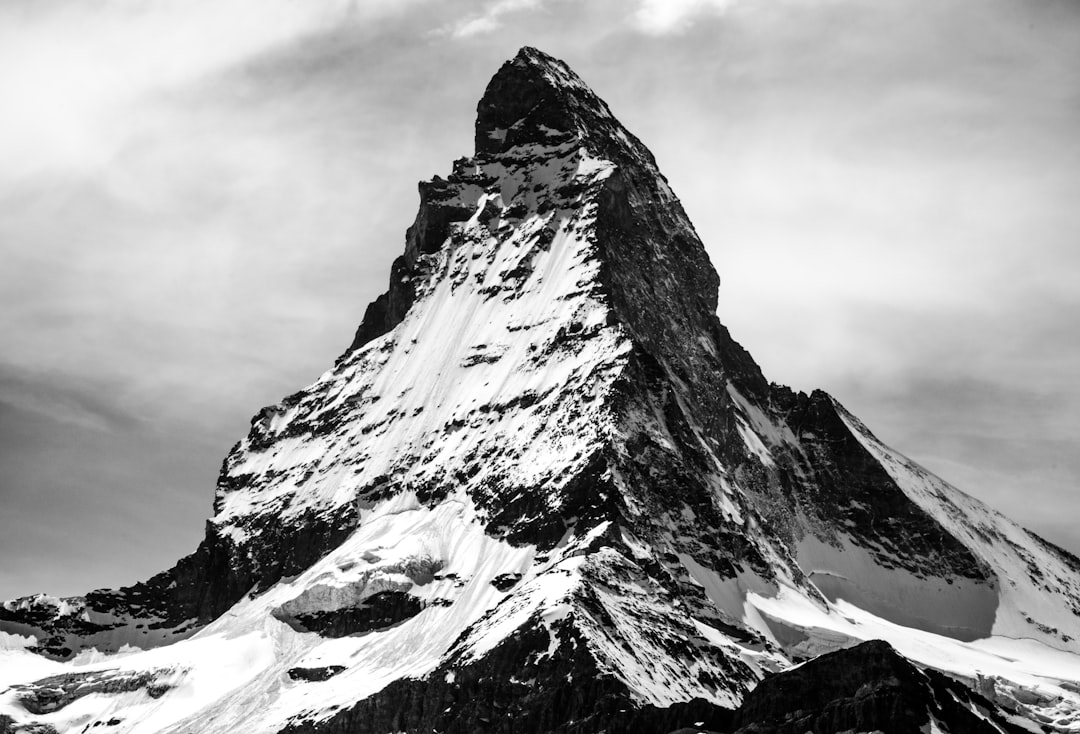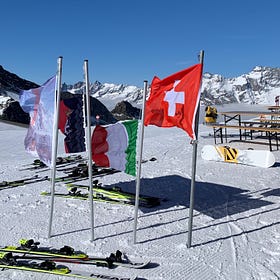
Welcome to The Matterhorn. Here, we investigate the intersections of literature and art across times, cultures, mediums, and genres. Each week, I look at a new topic through several texts with the aim to gain a better understanding of ourselves and our world.
**Coming in August 2022!**
Through investigating a topic from different artistic angles, often across time and cultures, we develop intertexts. As Julia Kristeva best articulates it, “the concept of intertextuality is a crossed threshold between languages and cultures” and “plac[es] us…in front of an interwoven structure,” that is, an ongoing literary and artistic dialogue. She likens it to a desire for what’s missing, like the middle of a “tasty doughnut.” In the in-between, through comparisons of human artistic responses to a real world issue, we can approach understanding.
The Matterhorn is the Swiss German name for a peak on the border of Switzerland and Italy; it means: “The Peak in the Meadows.” The Matterhorn is like an intertext itself – between two places, cultures, peoples…rising up to create something new. You can ski or hike over to the Italian side, where the mountain face looks completely different. The Italians call it Monte Cervino, which comes from the name for deer. The Matterhorn is also iconic; it is the most photographed mountain in the world. As a result, we have millions of international artists’ views of this one natural phenomenon that can together create a story.
Cultural Differences at the (Permeable) Border
The intertext is a kind of truth, but what is truth?
Are we in a post-truth world? Does truth still exist? Did it ever? Truth is difficult to define and probably one we’ll keep searching for our whole lives. Although many have tackled this elusive idea (as synthesized in the Stanford Encyclopedia of Philosophy), Oxford reduces it to three definitions:
the quality or state of being true
that which is true or in accordance with fact or reality
a fact or belief that is accepted as true
John Keats likens truth to beauty in “Ode on a Grecian Urn.” Virginia Woolf tells us: “Fiction…is likely to contain more truth than fact.” Though truth may be hard to pin point, some would argue this searching for it is the meaning of life.
What topics will we investigate?
Things that matter (get it?). I would also like to hear your suggestions. The topics will feed into ongoing series on: beauty, nature, truth, place, power, ethics, identity, creativity, representation, transformation, perspective, culture, and communication.
Here are a few examples of topics:
a concept: beauty, violence, individuality, change
a more specific idea or thing: growing up, plants, motherhood, schizophrenia
or even more specific: phone calls, tennis, doorways, roses
a place or person: Japan, the beach, Virginia Woolf
a type of philosophy or religion: existentialism, Islam, Zen Buddhism
an artistic movement: Harlem Renaissance, surrealism, gothic
a current event: climate change, war/conflict in XYZ, the actions of a global leader or celebrity, a financial crisis
What texts will you be looking at?
I explore the topic of the week through literature and art, including different types of texts.
I diversify the texts as much as possible, but also circle back to texts I love that can keep giving us more if we look at them from different angles. Each week, I also use at least one frame of literary or critical theory and often ground works within different artistic movements. I vet texts related to the topic, but that doesn’t mean it’s an exhaustive list. The highlights are meant to open up ideas and dialogue. You are encouraged to respond with your own suggestions.
Main texts: fiction, drama, poetry, literary non-fiction, film, visual arts
Also: literary journalism, song lyrics, multimedia, podcasts, music videos, architecture, fashion, travel writing, social media, dance, and more…
Why subscribe?
Anybody who enjoys making connections through the arts and learning from literature is welcome to join us. You might be a writer looking for material, a teacher looking for curriculum topics, a reader looking for their next books and articles, a traveller looking for art museums and shows, or someone who loved humanities classes in school and now does something completely different. All subscribers are welcome to offer suggestions of topics or texts and to engage in our ongoing dialogue.
Besides the weekly investigated topic, I send you additional ideas about internationalism, writing, and reading as well as personal observations and ideas from guest writers. We’ll be starting up the podcast soon, too.
Is it free?
At least two posts a month are free, including an introduction to the thematic exploration and one of the Saturday Brunch potpourri articles. Extra content for paid subscribers allows me to write and research full time at a higher level as well as pay guest writers and expand as a website, podcast, etc.. If you can support this project, I would really appreciate it! For the cost of a coffee a month, you can help this project to grow and get the full experience, which includes participation in our discussions.
Additionally, founding member patrons are invited to exclusive live monthly discussions. You can also see my website for contact details if you want to hire me for a workshop or writing retreat.
About me
I write novels and research culture through the arts. I taught literature, cultural studies, the arts, ethics, and epistemology for 20 years and have a PhD in Comparative Literature (as well as degrees in English, Art History, Literary & Cultural Studies, and Education). My PhD brought together work from Hong Kong and New York filmmakers about immigrants but drew on literature, law, spatial theory, and cultural studies. I’m a specialist at putting texts together to form ideas rather than one particular area of research. I’ve loved working in both secondary schools and universities in an interdisciplinary context which feels free and exciting to me. However, I still think there is great use of these silos so we may have experts in particular areas from which I and many others draw our research.
I’m originally from Boston but currently live in Basel with my family. I’ve also lived in Paris, Hong Kong, Milan, London, and Vienna. Living in 7 countries has added to the way I am able to investigate the arts from an international perspective. However, it’s also made me more aware of what I don’t know…which is a ton. I’m sharing with you things I’ve learned along the way as well as new research and discoveries. This project allows me to keep learning: to read from different authors, to attend art shows, to keep up with research on cultural studies, to check out new textualities…all these things I would want to do anyway, but I have an excuse to do them all the time and share my findings with you.
The project’s origins
The idea for this project built from my experiences teaching and researching and took shape during a 9 day solo ski trip at The Matterhorn. It also came from a book I published with Hachette’s Hodder Education for international teachers and from some educational consulting and workshops I was engaged with at that time through a business I founded, called Conceptual Literature. I found that I absolutely lit up when I was able to create curriculum, that is, to find texts that would work well together to help students (and teachers) learn about an idea.
My continuing work as an examiner for the International Baccalaureate also helps me frame this work; as I read student papers, I am always considering what the real purpose of their investigations are. Developing ideas with colleagues over the years has also achieved this effect; I’ve learned so much from all of them. I did this work extensively as a curriculum coordinator in Hong Kong and a department leader in Vienna. A few of the colleagues I’m in touch with will ask from time to time: hey I want to teach about surrealism – any ideas? Or, do you know any good Muslim authors I could use? I love, love going to my bookshelves or the University of Basel library to find wonderful texts that will make their classroom come alive. I also love it when they do the same for me.
To read more about my work and publications, please visit my author website: kathleenwaller.com.
Thank you for supporting this project!
Best,
Kate







I identify as intertextual. I remember one of my absolute fascinations for years has been to read a book or watch a movie, and read others experiences, responses, and what they thought of that particular work. So I started reviewing books on Goodreads and became absolutely obsessed.
I now read a book, write a review, and do my best to add my own "reaction"--whether I agree with the work, what I thought is true, etc.
I'm mad at myself that I only now just discovered you.
I'm thrilled to have found you on Office Hours, Kate. Now i understand a little more about why you named it 'The Matterhorn'.